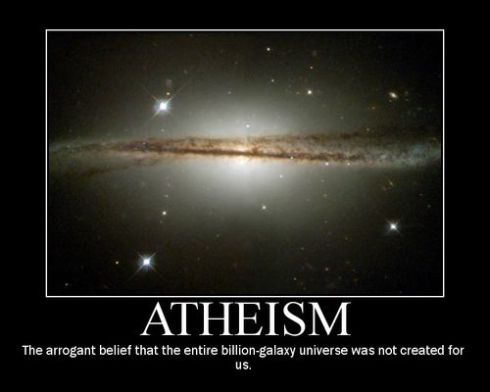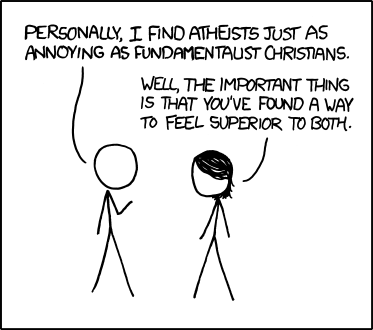As with the different types of non-theism, many theists have a lot of misconceptions where religion is concerned. Namely the relationship that atheists have with religion, and with the different types of religion. Given the affect that these misconceptions have, it is necessary to discuss them extensively. As such, part four will be broken up into ten posts. In this post I will discuss how atheists view religion and the relationships that we can have with religion. In the next part, I will discuss atheism and the Bible (with some time spent discussing Christianity and Judaism). Then I will discuss atheism and the Koran (again, I will spend some time discussing Islam). The fourth post will be dedicated to Western Religion in general, since there are two many religions for me to do a single post on. Then I will move to the Eastern Religions. I will discuss atheism in reference to Buddhism, Hinduism, and Eastern Religions in general respectively. Then I will discuss Spirituality, followed by faith. The faith discussion will include the difference between faith, belief, and knowledge and how atheists tend to view all three. And the final post will be on gods.
As I said, this talk will be about atheism and religion. As such, I will focus on how atheists say they view religion, how theists say atheists view religion, and how I personally view religion. I will begin with how theists say atheists view religion. But first we should discuss what religion actually is. It is important to realize that the three Abrahamic religions do not represent all religions. There is a much more varied religious world than those three religions can possibly represent. Religion is, to atheists at least, a human creation. As such, it is equally as complex as cultures are. Many forms of Buddhism are basically atheistic. They may regard the existence of gods as possible, but they often dismiss the concept of gods as irrelevant to the task of overcoming suffering. Atheists can be religious. Even some modern religions are open to atheists. Some humanists are religious, and many are members of the Unitarian Church. Raelians are a fairly recent religious group that explicitly denies the existence of gods. But this doesn’t tell us what religion is. The truth is, there really isn’t an answer. In fact, Religious Studies professors often refuse to even attempt to define it. This is because it is so difficult to pin down what all religions share in common. Some are theistic, others aren’t. Some believe that worship should be the main focus of religion, others believe that eliminating suffering should be. Some have demigods or angels, others have neither. Some religions are spiritual, but some aren’t. So what is religion? I suppose it’s whatever is labelled a religion.
Recently, a study was done on how people react to the concept of God. A popular science journal published an article about the study, which led to many claims about how atheists are actually religious. A Catholic website that I came across said that “Just like religious people, atheists became more distraught and nervous when asking God to do something bad. This is especially surprising because the study was conducted in Finland, where 16 percent of people do not believe in God and organized religion is not very popular.” To me, these studies aren’t surprising. Finland may have a large atheist population now, but, like the rest of Europe, it was dominated by Christianity for a very long time. Yes, those people who identify as atheists don’t believe in God. However, that doesn’t mean that Christianity has had no effect of their lives. Even if they don’t believe God is real, they can still have reactions to things related to Christianity. This doesn’t necessarily mean they are in denial about there belief in God, it likely just means that Christianity has had some influence on their lives.
Christian sites weren’t the only ones to discuss this study. Some secular magazines also talked about it. One such magazine wrote “Compared to the atheists, the believers reported feeling more uncomfortable reciting the God dares. But skin conductance data revealed the underlying emotional reactions of the two groups were essentially the same. This suggests that taunting God made the atheists more upset than they were letting on (even to themselves).” Our brains are funny things. We can’t always control how we react to things. And we aren’t always aware of how our bodies are reacting. Physiologically, the atheists may have reacted similarly to the Christians, but that doesn’t mean that they were aware of those reactions. Nor does it mean that those reactions accurately reflected how they felt (reacting and feeling aren’t exactly the same thing). Again, we do react to these subconsciously, and often those responses are learned. But we can hold beliefs that go against what our bodies suggest we believe. For example, when we are outside late at night and the wind blows through the trees, our bodies will react with fear. They will get ready to be attacked by something in the trees. Do we actually think that there is something in the trees? No. We know that it’s just the wind. But that doesn’t stop our bodies from reacting with fear.
Another Christian site said “Over the past few weeks, a theme of discussion on the Internet has been the proposal that atheists may not exist. Of course people who think they’re atheists exist, but a study discussed in Nature proposes that people really aren’t functionally atheists because we’re innately predisposed toward religion.” This summary annoys me. For one, the article in Nature says nothing about whether or not people are functionally atheists. In fact, the author himself is an atheist. And the author states “Perhaps one day we will find compelling evidence that a capacity for religious thoughts, rather than ‘religion’ in the modern form of socio-political institutions, contributed to fitness in ancestral times. For the time being, the data supports a more modest conclusion: religious thoughts seem to be an emergent property of our standard cognitive capacities.” The article is actually discussing whether religious thought, not being religious, but rather having religious thoughts, is evolutionary. To say otherwise is dishonest. And for another, the idea that people are lying about being atheists is insulting. Why would I lie about being an atheist? Because I like being insulted by religious people? Because I like being told I’m going to hell? Because I thought it would be fun to risk losing my family and friends? Because I didn’t think I was a part of enough oppressed groups? That seems very silly to me. That Christian site goes on to quote another Christian site:
“’While militant atheists like Richard Dawkins may be convinced God doesn’t exist, God, if he is around, may be amused to find that atheists might not exist.
Cognitive scientists are becoming increasingly aware that a metaphysical outlook may be so deeply ingrained in human thought processes that it cannot be expunged.
While this idea may seem outlandish — after all, it seems easy to decide not to believe in God — evidence from several disciplines indicates that what you actually believe is not a decision you make for yourself. Your fundamental beliefs are decided by much deeper levels of consciousness, and some may well be more or less set in stone.
This line of thought has led to some scientists claiming that ‘atheism is psychologically impossible because of the way humans think,’ says Graham Lawton, an avowed atheist himself, writing in the New Scientist. ‘They point to studies showing, for example, that even people who claim to be committed atheists tacitly hold religious beliefs, such as the existence of an immortal soul.’
This shouldn’t come as a surprise, since we are born believers, not atheists, scientists say. Humans are pattern-seekers from birth, with a belief in karma, or cosmic justice, as our default setting. ‘A slew of cognitive traits predisposes us to faith,’ writes Pascal Boyer in Nature, the science journal, adding that people ‘are only aware of some of their religious ideas.””
I wasn’t able to get access to the New Scientist magazine (which, despite popular belief, is not the same as a journal) article that is quoted, so I can’t say anything about it. However, have scanned the Nature journal article numerous times, and I read it thoroughly once. I can guarantee that the sentence “A slew of cognitive traits predisposes us to faith” only exists as a quote that is not in the actual body of the article. It is placed above the actual article and below the title to draw the reader in. Though the article does say “One important finding is that people are only aware of some of their religious ideas” in the body of the article. But the entire quote in the Christian site seems to be quote-mining in that it disregards the authors intentions in order to support the view of the author of the website. This is incredibly dishonest. While the article does talk about faith a bit, it is mostly as an after thought or an on-the-side. The article is concerned with religious thought and not whether people have faith. Also, the journal article does not come to any definitive conclusion. It doesn’t actually say whether or not religious thought is evolutionary, which is what it would say if it did come to that definitive conclusion.
But what does all that say about how religious people talk about atheists on religion? Given the articles that I discussed, I can say that science is still very much misinterpreted by lay-people. Nothing has shown that atheists don’t actually exist, but, despite there being nothing to suggest that idea in the scientific journal, that is the conclusion that people ran with. It also suggests that people don’t understand atheists. In the quote on the Christian site, the author claims that it is easy to decide to be an atheist, but in the journal article that they were using to support their views, it is said that “Atheism will always be a harder sell than religion.” So how can it be easier to decide not to believe in God, but harder to sell? That doesn’t make a whole lot of sense. As I said earlier, atheism isn’t something that one wants to lie about, nor that one comes to lightly, because atheists do risk a lot by coming out. Theists seem to believe that we just choose to become atheists willy-nilly. They often assume that we are rebelling or that we just don’t want to believe in gods. But this is not the case, and it is not fair to atheists to assume that it is.
So how do atheists view their relationship with religion? One atheist site I came across explained it like this:
“One of the most common pastimes in philosophical discussion is ‘the redefinition game.’ The cynical view of this game is as follows:
Person A begins by making a contentious statement. When person B points out that it can’t be true, person A gradually redefines the words he used in the statement until he arrives at something person B is prepared to accept. He then records the statement, along with the fact that person B has agreed to it, and continues. Eventually A uses the statement as an ‘agreed fact,’ but uses his original definitions of all the words in it rather than the obscure redefinitions originally needed to get B to agree to it. Rather than be seen to be apparently inconsistent, B will tend to play along.”
This is an explanation of the question “isn’t atheism a religious belief?” Atheism is not a religious belief, but many theists assume that it is. Religions can be atheistic, and atheism is a belief claim. As such, the theist can change their question to suggest that atheism is religion, but that is not something many atheists will agree to.
Another atheist site dealt with the question “Can atheists be religious?” They answered the question by saying that “Atheism and religion are often portrayed and treated as polar opposites; although there is a strong correlation between being an atheist and being irreligious, there is no necessary and inherent connection between the two.” Basically, many atheists do view religion and atheism as polar opposites, but some atheists view them as compatible. The author goes on to say “Atheism is not the same as being irreligious; theism is not the same as being religious. Atheists in the West tend not to belong to any religion, but atheism is quite compatible with religion. Theists in the West tend to be religious, but theism is compatible with irreligion.” This concept can be seen with religions like Buddhism that do not require a belief in gods, and with spirituality where people consider themselves to be spiritual but not religious.
As I hope you can see, the relationship that atheism has with religion is a complicated one. Are some atheists religious? Yes. Is that counter-intuitive? No. Religion is a complicated subject matter. The relationship that atheists have with religion should not be seen as black and white. It is not a case of us vs. them.
http://atheism.about.com/od/atheismquestions/a/Spirituality.htm
http://www.catholic.com/blog/trent-horn/do-atheists-believe-in-god-after-all
http://www.salon.com/2013/04/27/do_atheists_secretly_believe_in_god_partner/
http://www.evolutionnews.org/2014/08/evolutionary_st088461.html
http://infidels.org/library/modern/mathew/intro.html
http://atheism.about.com/od/atheismquestions/a/AtheismReligion.htm
http://www.newscientist.com/article/mg22229670.600-losing-our-religion-your-guide-to-a-godless-future.html



March 10th, 2015 at 9:06 am
My relationship with religion is not that I don’t want to have faith or whatever other things theists assume. It just never seemed necessary to be a theist, I lived my life perfectly content without it. And now I am older I am just realizing how illogical and how much it contradicts itself. That it makes me wonder why people are religious. Religion does not make much sense, the idea of a unicorn seems more logical and realistic. I think many theists cannot comprehend why they believe what they do, they simply do because there parents raised them that way and society imposed it on them through laws, media etc. Keep posting!
LikeLiked by 1 person
March 4th, 2015 at 3:11 pm
But I’m astounded that as an atheist you have invested so much time in understanding other religions….crazy though that buddi which some call a religion others a belief system or philosophy… But buddism with its deep ambivalence on the existence of a higher power is one of the more peaceful systems out there…why do you think that is?
LikeLiked by 1 person
March 23rd, 2015 at 10:34 am
Would you expect a General to go to war without knowing his enemy?
LikeLike
March 4th, 2015 at 3:05 pm
Man you are really into your atheism! I think I agree with a lot of your view points even though I definitely believe in “God” but honestly I think that’s where everyone gets tripped up. Who or what or how in the heck do you define “God”? It sure as hell isn’t what. Any of the organized religions are pushing on us…those Gods just tend to be larger than life men, inost cases….yeah uh no…that’s not God. Them what? Hard to explain, but basically you…you are God…well that’s how it works in my hippy dippy new age belief system anyway!
LikeLike
March 2nd, 2015 at 4:34 am
I enjoyed the philosophical approach and would question whether spiritual awareness is necessarily the same as religion.
The recognition that there are creatures in the Universe not limited by physical form is not a form of religion, so an Atheist need not be religious but spiritual.
Again many religions have no link with Theism as they lack the Spiritual acknowledgement so as you say a complex construction and it is best we sort it out for ourselves.
LikeLiked by 1 person
March 2nd, 2015 at 1:20 am
[…] Source: Atheism 101: Religion and Atheism […]
LikeLiked by 1 person
March 1st, 2015 at 11:31 pm
Reblogged this on Mohit – The caretaker.
LikeLiked by 1 person